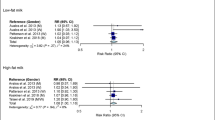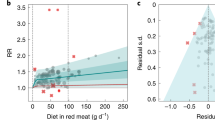Abstract
The aim of this systematic review and meta-analysis was to summarize the evidence from observational studies assessing the association between intake of trans fatty acids (TFA) and the risk of coronary heart disease (CHD), with a specific emphasis on distinguishing between TFA of industrial and ruminant origin. By searching five bibliographic databases, analyses from six published and two unpublished prospective cohort studies, assessing the association of intake of TFA with fatal and/or non-fatal CHD, were identified. Four and three studies reported separate associations for intake of ruminant or industrial-TFA, respectively. The pooled relative risk estimates for comparison of extreme quintiles of total-TFA intake (corresponding to intake increments ranging from 2.8 to ∼10 g/day) were 1.22 (95% confidence interval: 1.08–1.38; P=0.002) for CHD events and 1.24 (1.07–1.43; P=0.003) for fatal CHD. Ruminant-TFA intake (increments ranging from 0.5 to 1.9 g/day) was not significantly associated with risk of CHD (risk ratio (RR)=0.92 (0.76–1.11); P=0.36), and neither was industrial-TFA intake, although there was a trend towards a positive association (RR=1.21 (0.97–1.50); P=0.09). In conclusion, our analysis suggests that industrial-TFA may be positively related to CHD, whereas ruminant-TFA is not, but the limited number of available studies prohibits any firm conclusions concerning whether the source of TFA is important. The null association of ruminant-TFA with CHD risk may be due to lower intake levels.
This is a preview of subscription content, access via your institution
Access options
Subscribe to this journal
Receive 12 print issues and online access
$259.00 per year
only $21.58 per issue
Buy this article
- Purchase on Springer Link
- Instant access to full article PDF
Prices may be subject to local taxes which are calculated during checkout


Similar content being viewed by others
References
Ascherio A, Hennekens CH, Buring JE, Master C, Stampfer MJ, Willett WC (1994). Trans-fatty-acids intake and risk of myocardial-infarction. Circulation 89, 94–101.
Ascherio A, Rimm EB, Giovannucci EL, Spiegelman D, Stampfer M, Willett WC (1996). Dietary fat and risk of coronary heart disease in men: cohort follow up study in the United States. BMJ 313, 84–90.
Brouwer IA, Wanders AJ, Katan MB (2010). Effect of animal and industrial trans fatty acids on HDL and LDL cholesterol levels in humans-A quantitative review. PLoS One 5, e9434.
Chardigny JM, Destaillats F, Malpuech-Brugere C, Moulin J, Bauman DE, Lock AL et al. (2008). Do trans fatty acids from industrially produced sources and from natural sources have the same effect on cardiovascular disease risk factors in healthy subjects? Results of the trans fatty acids collaboration (TRANSFACT) study. Am J Clin Nutr 87, 558–566.
Craigh-Schmidt M, Rong Y (2009). Evolution of worldwide consumption of trans fatty acids. In: Destaillats F, Sebedio J-L, Dionisi F, Chardigny J-M (eds) Trans Fatty Acids in Human Nutrition. The Oily Press: Bridgwater, England, pp 329–380.
Dersimonian R, Laird N (1986). Metaanalysis in clinical-trials. Control Clin Trials 7, 177–188.
Folsom AR, Arnett DK, Hutchinson RG, Liao FZ, Clegg LX, Cooper LS (1997). Physical activity and incidence of coronary heart disease in middle-aged women and men. Med Sci Sports Exerc 29, 901–909.
Hallmans G, Agren A, Johansson G, Johansson A, Stegmayr B, Jansson JH et al. (2003). Cardiovascular disease and diabetes in the northern Sweden health and disease study cohort-evaluation of risk factors and their interactions. Scand J Public Health 31, 18–24.
Higgins JPT, Thompson SG (2002). Quantifying heterogeneity in a meta-analysis. Stat Med 21, 1539–1558.
Higgins JPT, Thompson SG, Deeks JJ, Altman DG (2003). Measuring inconsistency in meta-analyses. BMJ 327, 557–560.
Hu FB, Stampfer MJ, Manson JE, Rimm E, Colditz GA, Rosner BA et al. (1997). Dietary fat intake and the risk of coronary heart disease in women. N Engl J Med 337, 1491–1499.
Jakobsen MU, Overvad K, Dyerberg J, Heitmann BL (2008). Intake of ruminant trans fatty acids and risk of coronary heart disease. Int J Epidemiol 37, 173–182.
L’Abbe MR, Stender S, Skeaff CM, Ghafoorunissa, Tavella M (2009). Approaches to removing trans fats from the food supply in industrialized and developing countries. Eur J Clin Nutr 63, S50–S67.
Leth T, Jensen HG, Mikkelsen AAE, Bysted A (2006). The effect of the regulation on trans fatty acid content in Danish food. Atheroscler Suppl 7, 53–56.
Liberati A, Altman DG, Tetzlaff J, Mulrow C, Gotzsche PC, Ioannidis JPA et al. (2009). The PRISMA statement for reporting systematic reviews and meta-analyses of studies that evaluate health care interventions: explanation and elaboration. Plos Med 6, e1000100.
Liu SM, Buring JE, Sesso HD, Rimm EB, Willett WC, Manson JE (2002). A prospective study of dietary fiber intake and risk of cardiovascular disease among women. J Am Coll Cardiol 39, 49–56.
Motard-Belanger A, Charest A, Grenier G, Paquin P, Chouinard Y, Lemieux S et al. (2008). Study of the effect of trans fatty acids from ruminants on blood lipids and other risk factors for cardiovascular disease. Am J Clin Nutr 87, 593–599.
Mozaffarian D, Katan MB, Ascherio A, Stampfer MJ, Willett WC (2006). Trans fatty acids and cardiovascular disease. N Engl J Med 354, 1601–1613.
Oh K, Hu FB, Manson JE, Stampfer MJ, Willett WC (2005). Dietary fat intake and risk of coronary heart disease in women: 20 years of follow-up of the nurses’ health study. Am J Epidemiol 161, 672–679.
Oomen CM, Ocke MC, Feskens EJ, Van Erp-Baart MA, Kok FJ, Kromhout D (2001). Association between trans fatty acid intake and 10-year risk of coronary heart disease in the zutphen elderly study: a prospective population-based study. Lancet 357, 746–751.
Pietinen P, Ascherio A, Korhonen P, Hartman AM, Willett WC, Albanes D et al. (1997). Intake of fatty acids and risk of coronary heart disease in a cohort of Finnish men. The alpha-tocopherol, beta-carotene cancer prevention study. Am J Epidemiol 145, 876–887.
Singh RB, Niaz MA, Ghosh S, Beegom R, Rastogi V, Sharma JP et al. (1996). Association of trans fatty acids (vegetable ghee) and clarified butter (Indian ghee) intake with higher risk of coronary artery disease in rural and urban populations with low fat consumption. Int J Cardiol 56, 289–298.
Skeaff CM, Miller J (2009). Dietary fat and coronary heart disease: summary of evidence from prospective cohort and randomised controlled trials. Ann Nutr Metab 55, 173–U287.
Smit LA, Baylin A, Campos H (2010). Conjugated linoleic acid in adipose tissue and risk of myocardial infarction. Am J Clin Nutr 92, 34–40.
Tardy AL, Lambert-Porcheron S, Malpuech-Brugere C, Giraudet C, Rigaudiere JP, Laillet B et al. (2009). Dairy and industrial sources of trans fat do not impair peripheral insulin sensitivity in overweight women. Am J Clin Nutr 90, 88–94.
Turpeinen AM, Mutanen M, Aro A, Salminen I, Basu S, Palmquist DL et al. (2002). Bioconversion of vaccenic acid to conjugated linoleic acid in humans. Am J Clin Nutr 76, 504–510.
Warensjo E, Jansson JH, Cederholm T, Boman K, Eliasson M, Hallmans G et al. (2010). Biomarkers of milk fat and the risk of myocardial infarction in men and women: a prospective, matched case-control study. Am J Clin Nutr 92, 194–202.
Wells GA, Shea B, O’Connell D, Petersen J, Welch V, Losos M et al. The Newcastle-Ottawa Scale (NOS) for assessing the quality of nonrandomized studies in meta-analyses. http://www.ohri.ca/programs/clinical_epidemiology/oxford.htm. Accessed 29 September 2009.
Willett WC (2006). Trans fatty acids and cardiovascular disease-epidemiological data. Atheroscler Suppl 7, 5–8.
Willett WC, Stampfer MJ, Manson JE, Colditz GA, Speizer FE, Rosner BA et al. (1993). Intake of trans-fatty-acids and risk of coronary heart-disease among women. Lancet 341, 581–585.
Wolff R, Precht D, Molkentin J (1998). Occurrence and distribution of profiles of trans-18:1 acids in edible fats of natural origin. In: Sebedio J-L, Christie WW (eds). Trans Fatty Acids in Human Nutrition. The Oily Press: Dundee, pp 1–33.
Xu JQ, Eilat-Adar S, Loria C, Goldbourt U, Howard BV, Fabsitz RR et al. (2006). Dietary fat intake and risk of coronary heart disease: the strong heart study. Am J Clin Nutr 84, 894–902.
Acknowledgements
We thank the investigators of Finnish Mobile Clinic Health Examination Survey who shared unpublished data with us: P Knekt, A Reunanen, R Seppänen, R Järvinen and A Aromaa, and K Robien and S Motzinger from the Iowa Womens’ Health Study for performing data analyses on our request and sharing the data with us. Arla Food Amba provided financial support for the execution of this review. The Parker Institute, Musculoskeletal Statistics Unit is sponsored by the Oak Foundation.
Author information
Authors and Affiliations
Corresponding author
Ethics declarations
Competing interests
AA is a member of Communications and Scientific Advisory Board of The Global Dairy Platform, Chicago, IL, USA and has received research grants from Arla Foods Amba and the Danish Dairy Foundation. NTB, RC and EMB have no conflict of interest.
Additional information
Supplementary Information accompanies the paper on European Journal of Clinical Nutrition website
Supplementary information
Rights and permissions
About this article
Cite this article
Bendsen, N., Christensen, R., Bartels, E. et al. Consumption of industrial and ruminant trans fatty acids and risk of coronary heart disease: a systematic review and meta-analysis of cohort studies. Eur J Clin Nutr 65, 773–783 (2011). https://doi.org/10.1038/ejcn.2011.34
Received:
Revised:
Accepted:
Published:
Issue Date:
DOI: https://doi.org/10.1038/ejcn.2011.34
Keywords
This article is cited by
-
A comprehensive toxicological analysis of trans-fatty acids (TFAs) reveals a pro-apoptotic action specific to industrial TFAs counteracted by polyunsaturated FAs
Scientific Reports (2023)
-
Circulating trans fatty acids are associated with prostate cancer in Ghanaian and American men
Nature Communications (2023)
-
Molecular effects of the consumption of margarine and butter varying in trans fat composition: a parallel human intervention study
Lipids in Health and Disease (2022)
-
Lipid and saturated fatty acids intake and cardiovascular risk factors of obese children and adolescents
European Journal of Clinical Nutrition (2021)
-
Food for Thought or Feeding a Dogma? Diet and Coronary Artery Disease: a Clinician’s Perspective
Current Cardiology Reports (2021)



